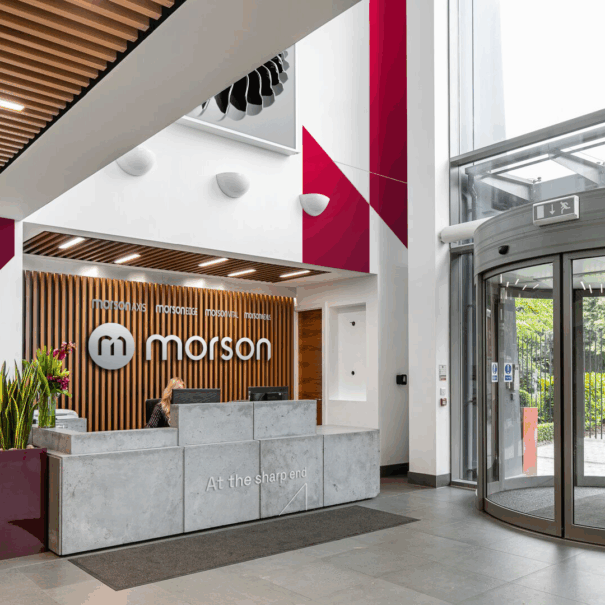17.11.2025
Morson Group has embarked on the most significant structural transformation in its history and it arrives at a moment when the UK economy needs it most. As industry races to deliver the country’s critical infrastructure, meet national security demands, and transition to a net-zero future, the pressure on organisations to access, develop, and retain the right skills has never been greater.
This transformation isn’t cosmetic. It’s not a new logo or a refreshed colour palette. It’s a fundamental reshaping of who we are, how we operate, and how we deliver value. It unites the full breadth of Morson’s capabilities into a single, integrated ecosystem designed to help clients and the workforce navigate the biggest industrial and technological shift of our generation.
Morson Group Executive Chairman, Ged Mason OBE said:
“This transformation marks the biggest structural change in Morson’s history, designed to help UK industry build the skilled workforces needed to deliver the country’s critical infrastructure and net-zero ambitions. This isn’t a cosmetic rebrand. It’s about uniting our capabilities so we can help clients – and the worlds workforce – navigate the biggest transformation of our generation”
This is Morson’s response to the challenges reshaping global industry and a bold step toward the future.
Why Now? The external forces redefining what organisations need
Industries across the UK are undergoing rapid transformation. Technology adoption, workforce shortages, shifting procurement behaviours, and rising productivity demands are changing what organisations expect from their talent partners.
1. Clients expect digital sophistication, from everyone
As employers adopt digital tools, automation, and data-driven decision-making, they expect the same level of capability from their partners. The labour market is tight, technology-driven, and increasingly competitive.
Morson’s transformation positions the group as a data-intelligent, tech-enabled talent partner one that uses insight, analytics, and AI-powered tools to deliver speed, accuracy, and value.
2. Productivity pressures are driving long-term, strategic partnerships
Procurement has shifted decisively away from transactional recruitment. Organisations want integrated workforce ecosystems that minimise risk, boost productivity, and support long-term planning.
Morson’s new structure enables clients to access a complete talent lifecycle, from consultancy and talent supply to project delivery and skills development all under one strategic partner.
3. Structural skills shortages demand more than recruitment
Across engineering, defence, power, transportation, and technology, skills shortages have become a structural, systemic challenge. Businesses need partners that can map markets, forecast capability needs, and build the skills of the future.
Morson’s rebrand formally organises the business around four core capabilities that directly address the four universal workforce challenges organisations now face.
A unique market position
Through this transformation, Morson is claiming a strategic position unmatched in the UK market.
We are now the only organisation of our size and scale offering four fully integrated capabilities consultancy (Praxis), recruitment (Edge), project delivery (Vital), and training/reskilling (Nexus) connected in a way that reflects how clients increasingly buy and manage talent.
Four specialist units. One ecosystem.
- Morson Edge → Supplies specialist talent that powers progress (formerly Morson Talent, Anderselite, Bridge IT, Morson Technical Services, Morson USA, Morson Canada, Cornwallis ELT, InterQuest and ECOM, plus ACRWORLD and PTS Advance rebranding in 2026)
- Morson Praxis → Applies technical consultancy and innovation expertise to accelerate transformation (formerly Morson Projects, Morson Projects SRL, Astraeus, Ematics, Waldeck plus Orange Solutions rebranding in 2026)
- Morson Vital → Deploys expert teams with agility and urgency to strengthen infrastructure and keep things moving (formerly Vital Human Resources)
- Morson Nexus → Connects future skills, from first professional steps to reskilling and retraining (formerly Morson Training plan 3B Training rebranding in 2026)
A structure built around how sectors actually operate
Morson’s new sector-led structure places specialist leadership teams across six key industries:
- Aerospace & Defence: high activity levels, with upcoming change expected from the Strategic Defence Review.
- Transportation (Rail): currently in a low cycle, but with potential uplift through Control Period 7 (CP7).
- Infrastructure: major concurrent projects driving intense demand amid an ageing workforce.
- Energy: nuclear renaissance, severe talent shortages, and shifting demand across renewables and traditional generation.
- Water: exceptionally busy sector, with high transferability from adjacent fields.
- Technology: balancing rapid AI-driven innovation with budget uncertainty.
Across these sectors, Morson has a distinct advantage: deep expertise in high-compliance, highly regulated environments. This enables us to deliver safe, scalable transformation in the industries where risk, governance, and precision matter most.
The internal transformation powering the external change
This rebrand isn’t branding at all it’s structural reform. Inside Morson, almost everything has evolved.
1. New leadership and a unified operating model
Four strategic business units now operate with aligned structures, sector specialisation, and shared governance. Managing directors are supported by dedicated client service leads, ensuring clearer accountability and consistent delivery.
2. Integration across all capabilities
Praxis, Edge, Vital, and Nexus now operate as one interconnected ecosystem. Shared data, aligned service models, and seamless cross-unit collaboration allow Morson to solve the immediate challenge while addressing the systemic issues that sit beneath it.
3. Investment in next-generation technology
A cornerstone of the transformation is Morson’s bespoke AI recruitment platform built in partnership with Palantir. This enables:
- Faster, smarter candidate matching
- Deep insight into scarce talent pools
- Predictive workforce planning
- Enhanced compliance and accuracy
By piloting AI within our own workforce processes, we’re better placed to help clients adopt similar digital workforce strategies.
The result is a Morson that is more connected, more agile, and more data-intelligent than ever before.
What this means for clients
At its core, the transformation is designed to make it easier for clients to access the right expertise faster, smarter, and with more confidence. By integrating four distinct yet complementary capabilities, we can now solve the full spectrum of challenges facing organisations today.
Solving skills shortages
- Edge: rapid specialist talent supply
- Nexus: long-term capability building
- Praxis: realistic workforce planning
Fixing fragmented supply chains
- A single ecosystem across consultancy, recruitment, training, and project delivery
- One governance system
- Full visibility and accountability
Closing capability gaps and future-proofing teams
- Early identification of skill gaps
- Reskilling and future skills programmes
- Access to niche expertise
Reducing cost, risk, and compliance burden
- Group-wide ESG, HSQE, and audit frameworks
- Real-time workforce analytics
- Automated governance
Scaling innovation and delivery
- Specialist talent at speed
- Ready-made deployment teams
- Consultancy-led transformation
- Long-term learning pathways
Clients gain sharper visibility, faster mobilisation, lower risk, and stronger productivity delivered by people who understand their sector and speak their language.
Innovation is accelerating. Talent is scarce. Industry is transforming.
Morson has transformed to meet the moment giving clients a single strategic partner across the entire talent lifecycle, uniquely capable of building the skills, resilience, and agility needed to compete for the future.




